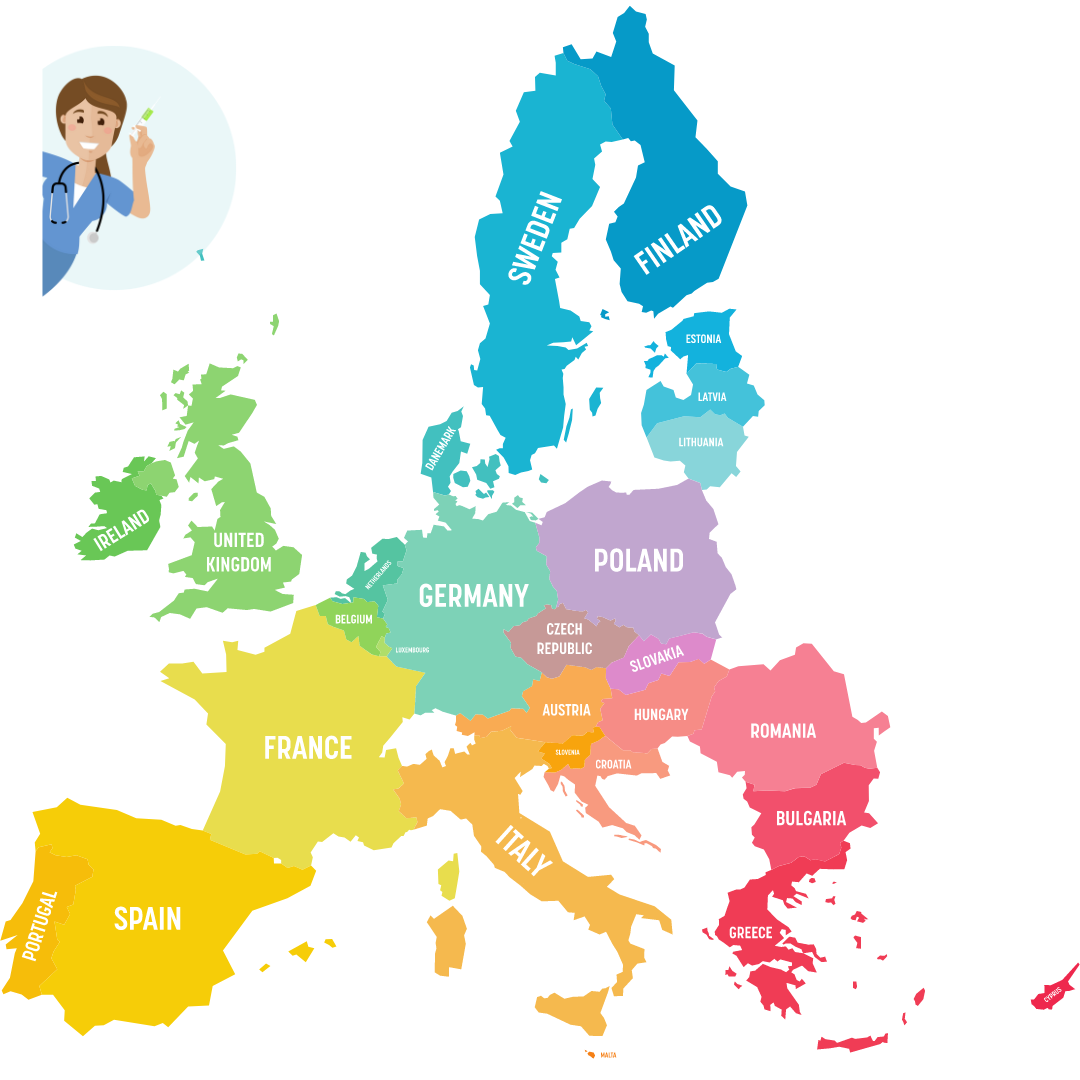As you prepare to embark on your European adventure, remember that health should be a top priority. Like any other region, Europe has its own diseases and health concerns that travellers should be aware of. In this blog, we will explore some of the common diseases you might encounter while exploring Europe and provide valuable tips on prevention and management.

The flu virus is prevalent worldwide, and Europe is no exception. Travellers, especially during peak flu season (typically winter months), would take precautions to avoid contracting the flu. Consider getting vaccinated before your trip and practice good hygiene, such as frequent handwashing and avoiding close contact with sick individuals.
Norovirus is highly contagious and often spreads through contaminated food, water or surfaces. Symptoms include vomiting, diarrhoea, stomach cramps and nausea. To reduce the risk of norovirus infection, be cautious of food hygiene practices, opt for bottled water, and wash hands regularly, particularly before eating.
Lyme disease and Tick tick-borne encephalitis are found in some parts of Europe, particularly in wooded or rural areas. To prevent tick bites, wear long-sleeved clothing, use insect repellent containing DEET, and conduct regular tick checks after spending time outdoors.
A vaccination is available for Tick-borne Encephalitis if you are at risk of contracting this disease.
There is no vaccine for Lyme Disease.
Hepatitis A is a viral infection transmitted through contaminated food and water, or by direct contact with an infectious person. Travellers should ensure they are vaccinated against Hepatitis A before visiting Europe, particularly if venturing to regions with poor sanitation or hygiene standards. Additionally, practising good food and water hygiene can significantly reduce the risk of infection.
A Hepatitis A vaccine is recommended for certain travellers.
Rabies is a viral infection which is usually transmitted following contact with the saliva of an infected animal, most often via a bite, scratch or lick to an open wound or mucous membrane (such as eye, nose or mouth)
Many European countries consider rabies a risk, and vaccines are recommended for certain travellers.
Travellers should avoid contact with animals. Rabies is preventable with vaccine pre-exposure followed up with prompt post-exposure vaccines. For unvaccinated travellers who have been exposed to saliva, prompt post-exposure vaccinations will prevent Rabies infection.
Measles is a highly infectious viral illness with the potential for serious and life-threatening complications. Travel remains an important factor in the international spread of measles.
In February 2024, 29 countries reported measles to the European Surveillance System. Measles transmissions have increased over the last 12 months, although the situation varies by country. Some countries report large outbreaks, and others sustain no or very low transmission.
It is advised that all UK travellers have received 2 MMR vaccines as part of their childhood immunisations. If you have not completed the 2-dose course, it is advisable to do so before your trip.
Tetanus is caused by a neurotoxin produced by bacteria spores introduced into the body through a puncture wound, burn or scratch contaminated with soil.
Travellers should have completed a tetanus vaccination course according to the UK schedule. A booster dose is recommended if the last dose was more than 10 years ago.
Hepatitis B is a viral infection transmitted by exposure to infected blood or body fluids.
2% or more of the population in certain regions of Europe are known or thought to be persistently infected with Hepatitis B Virus
Travellers should avoid contact with blood or fluids, including:
A sterile medical equipment kit may be helpful when travelling to resource-poor areas.
A Hepatitis B vaccine is recommended for certain travellers.
Traveller’s Diarrhoea is a common ailment affecting many travellers worldwide, including those visiting Europe. Contaminated food and water are the primary culprits. To minimise the risk, stick to bottled or boiled water, avoid consuming raw or undercooked foods, and opt for reputable dining establishments.
Pack over-the-counter anti-diarrhoeal medication, e.g. Imodium, as a precaution.
For Individualised risk assessment for your trip to Europe, book a video consultation with our Nurse Specialist.
Resources:
https://www.travelhealthpro.org.uk/countries
https://www.ecdc.europa.eu/en
https://www.fitfortravel.nhs.uk/home
Written by Amanda Howarth May 2024
Are you planning an exciting adventure abroad? Whether you’re embarking on a tropical vacation, a backpacking trip through Asia, or a Safari in Africa, ensuring you are up to date with your travel vaccinations is crucial for a safe and healthy journey.
This guide will address some common questions regarding travel vaccinations, including where to get them, which ones are free on the NHS, how to obtain them, and the ideal timeframe to schedule your vaccinations before your trip.
Cholera is a serious illness caused by a bacteria known as Vibrio cholerae. It is particularly risky in areas with poor water treatment, sanitation, and hygiene practices.
Even though cholera is not common in the UK, it can pose significant risks to travellers visiting affected regions. This article delves into the nature of cholera, the dangers it presents to UK travellers, and the measures that can be taken to prevent it.
The Zika virus is a disease transmitted by mosquitoes that has received a lot of media attention in recent years due to its severe health implications, especially for pregnant women. It’s important to be aware of the risks and take steps to prevent it in order to have a safe and healthy experience
Embarking on a gap year adventure is an exciting milestone. Exploring new cultures, meeting people from different backgrounds, and experiencing the world beyond your comfort zone is invaluable. However, it’s crucial to prioritise your health while travelling. Here’s a comprehensive guide to ensure you stay healthy and make the most of your gap year journey.